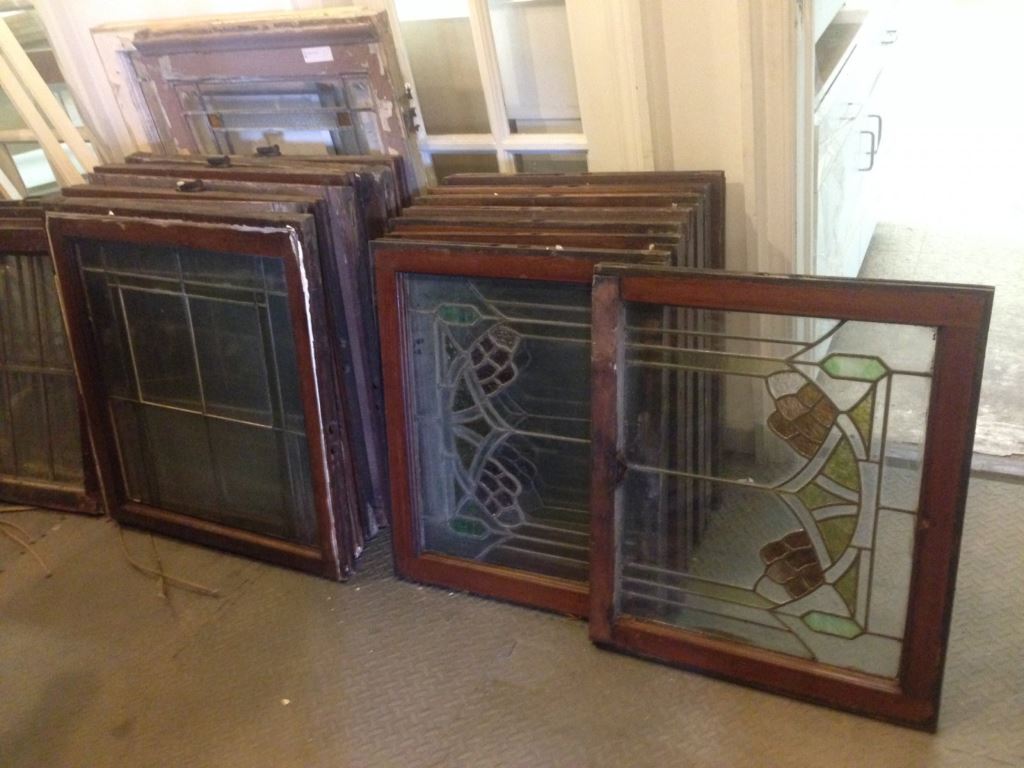Big Green Recycling Machine
WasteCap Solutions has helped city and businesses salvage 515 miles of dumpster waste.
WasteCap Resource Solutions is a nonprofit organization whose mission is to eliminate waste and provide recycling assistance to businesses. The group began in 1996 as a collaborative effort between the Wisconsin DNR and businesses with need for waste elimination.
Alex Ogden, Marketing Specialist for WasteCap Resource Solutions, says it has many ways to eliminates waste, often involving salvaging and selling materials from deconstruction and demolition. The group’s Milwaukee headquarters and material shop was formerly located on Seeboth St., but the company relocated recently to a larger facility at 2123 W. Michigan St.
The shop holds reclaimed materials of many types – barn doors, crown molding, stained glass windows, light fixtures, hardwood floor planks, water heaters, and yes, even kitchen sinks. Shoppers find quality, recycled materials at half the cost of retail. The store is chock-full of materials ready for home remodelers, architect firms, and artists.
How does WasteCap end up with all this stuff? “We work with a lot of large scale contractors and developers to make sure their materials are kept out of landfills and the big incentive to them is that it is more cost effective for them to do that,” Ogden says.
Ogden says 30 percent to 40 percent of the materials dumped in landfills are from construction demolition, of which 90 percent is recyclable. Both the landfill fee and the cost of transporting deconstruction materials are costly for companies, whereas WasteCap typically takes the stuff off their hands for no charge.
WasteCap receives a “Raz-List” from the City of Milwaukee. This list includes foreclosed homes and buildings that will be torn down one way or the other. Some are eligible for deconstruction, meaning they torn down by hand by workers, rather than razed by machines. Ogden says the price tag on razing a house is $15,000 charged to the city, so deconstruction saves money for taxpayers. WasteCap also pays the city for materials salvaged from tear-downs.
The non-profit also provides training and employment opportunities for their workers. Ogden says most of the workers that receive this paid training live in the area and the money they make ends up going back into the local economy.
WasteCap also performs waste audits, which Ogden describes as “digging through your trash” and showing businesses what exactly is going into their waste streams. They show companies how to increase recycling on site and reduce the materials going into a landfill. One such example is for large companies with in-house coffee shops. They are encouraged to provide coffee mugs for their employees. Ogden says disposable coffee cups are usually not recyclable and make up a large portion of a company’s waste.
Another successful project involved the recent deconstruction of the Northwestern Mutual building. Seventeen floors’ worth of carpet tiles were going to be sent to the landfill, which would have cost $8,000 plus the cost of removal. Instead, WasteCap connected them with an organization that uninstalled and hauled the carpet away at no charge because they were going to clean and resell the tiles. The result was an economical and environmental win for all three parties.
WasteCap provided some interesting statistics on its impact to Fox 6:
-In 2015, WasteCap provided 22 Residential Preference Program trainees paid work opportunities totaling more than 1000 worker hours.
-WasteCap and its clients have diverted over 618,000 tons or 1.236 billion pounds of construction and demolition waste from landfills. That’s the equivalent of 235,451 trees saved by recycling wood and wood products.
-If you were to place 30 yard dumpsters end to end, WasteCap has diverted over 515 miles of full dumpsters through their projects
-On average, its salvage projects recycle 88 percent of all materials.
There are times when economic feasibility prevents WasteCap from salvaging. Sometimes really great materials are available but hauling and transportation costs prevent businesses from choosing the more “green” route, Ogden says.
WasteCap’s most recent federal tax form, or 990, shows its annual budget is just over $400,000, with about half of the income coming from program revenue and contributions accounting for about more than one-quarter of income. Its executive director Joe Liebau earned $55,000.
Community members can support the non-profit by purchasing an individual warehouse membership. The cost is $100 annually and members receive a five percent discount on all materials in-store.
Opening week for their material shop began on July 15. Hours are Wednesday-Friday from 9 a.m. to 5 p.m., and from 10 a.m. to 2 p.m. on Saturdays.





















